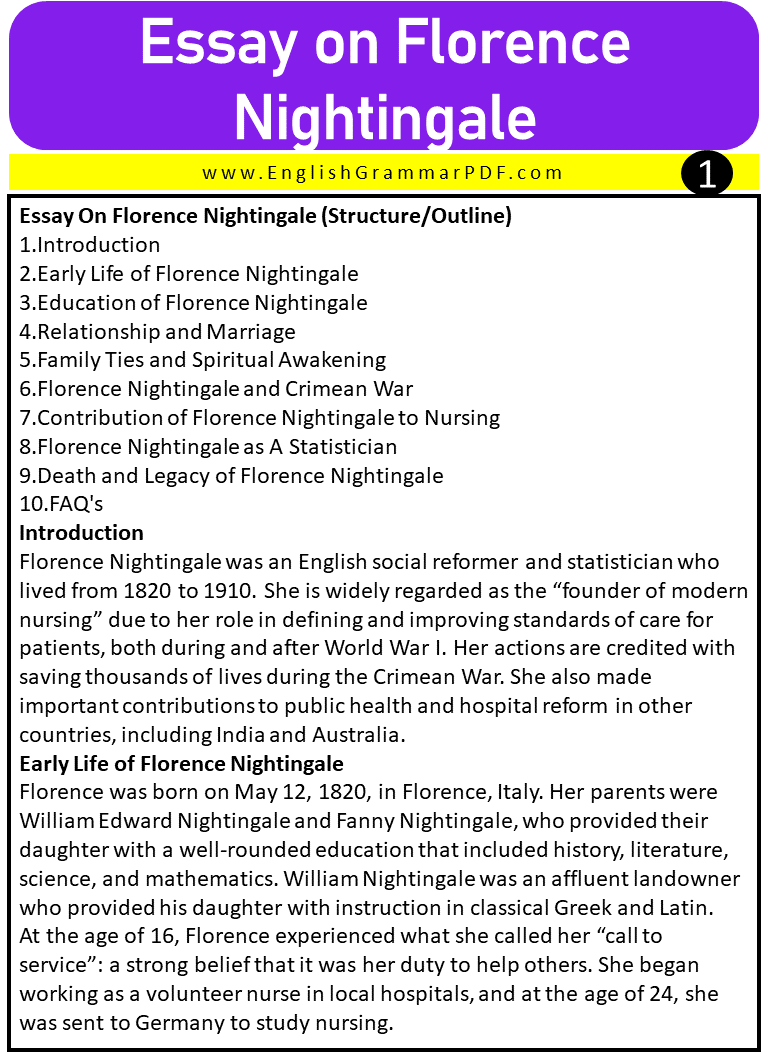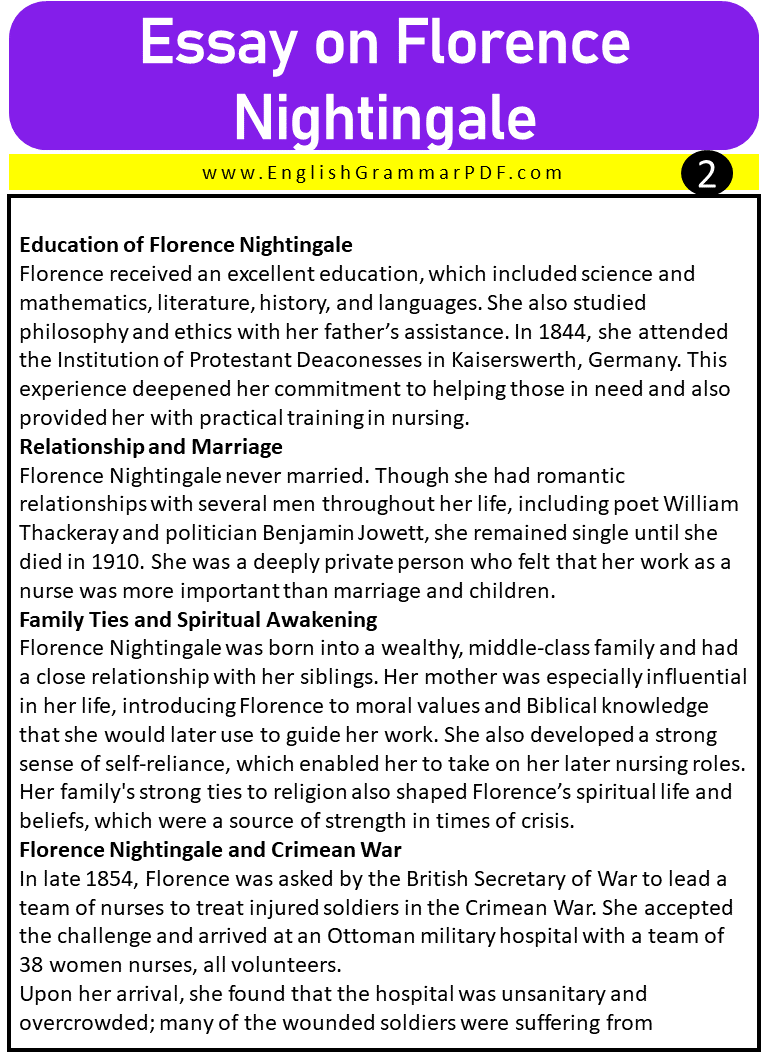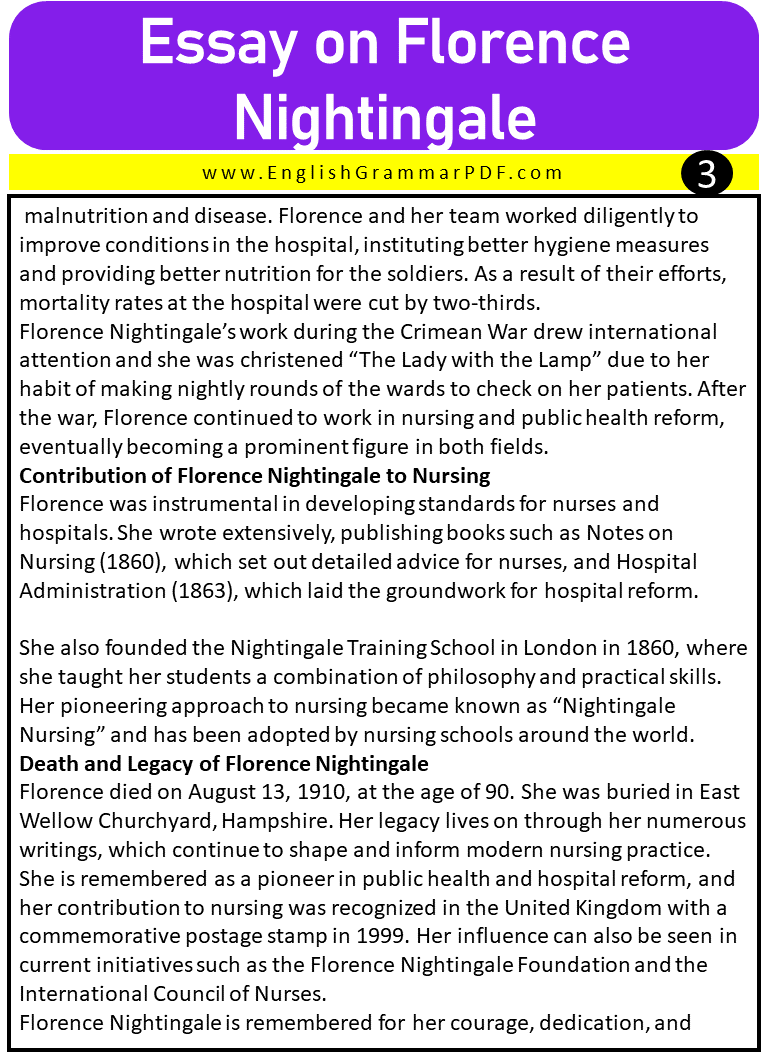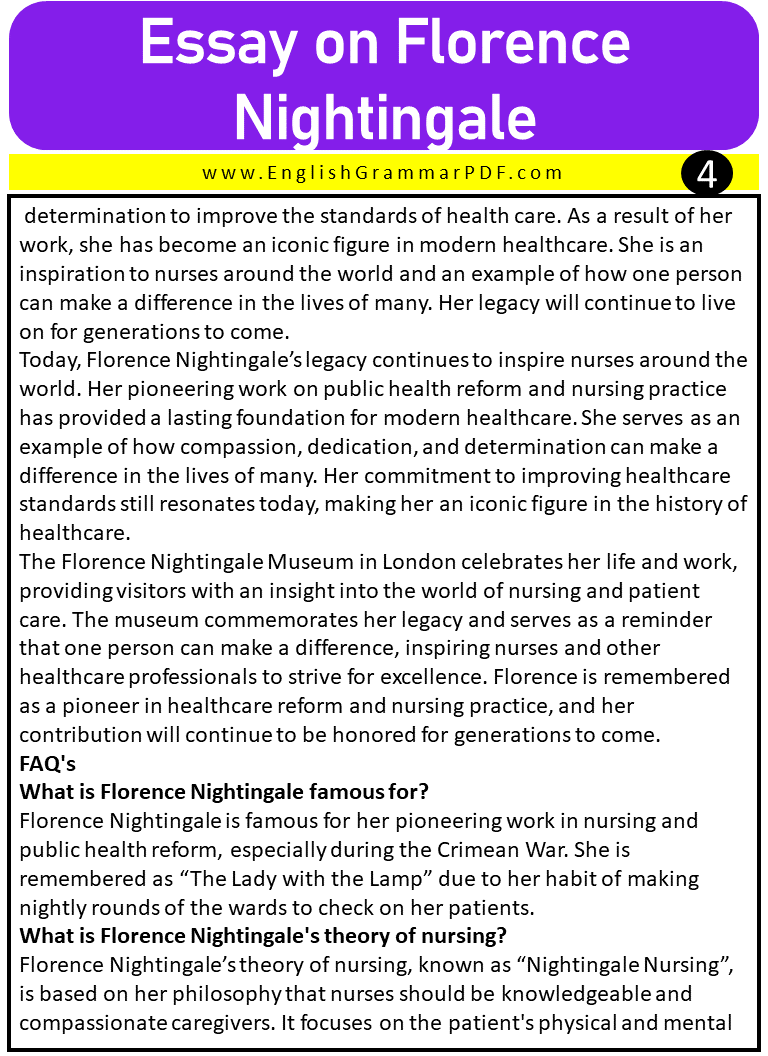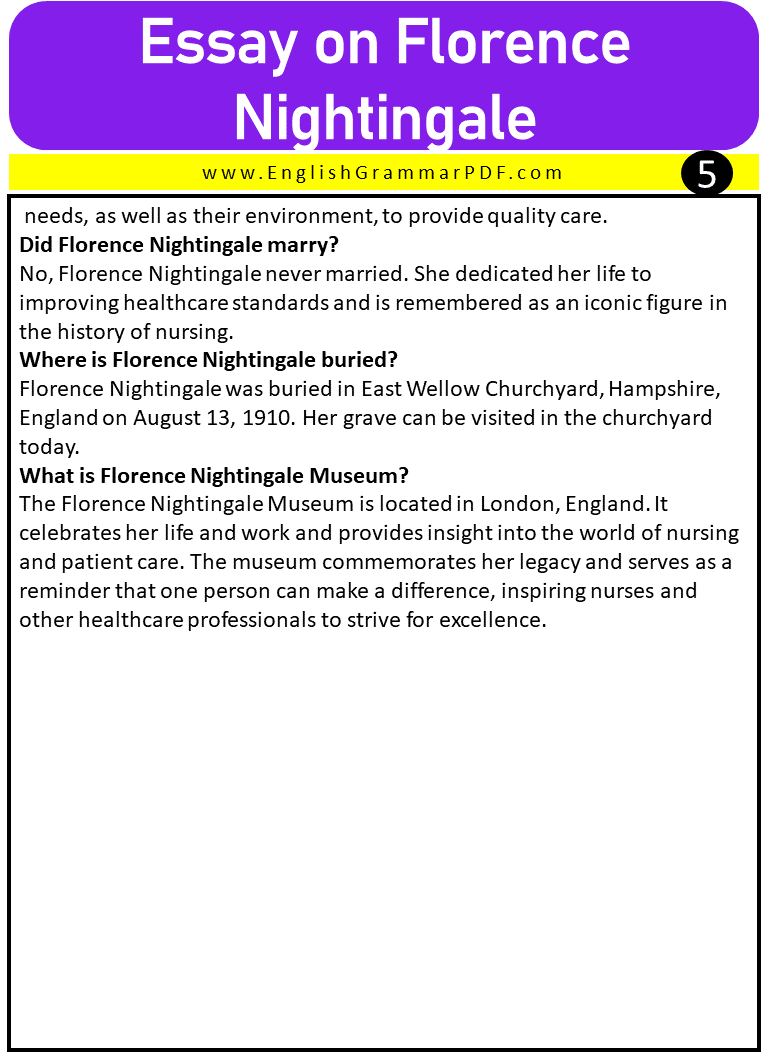Essay On Florence Nightingale (Structure/Outline)
- Introduction
- Early Life of Florence Nightingale
- Education of Florence Nightingale
- Relationship and Marriage
- Family Ties and Spiritual Awakening
- Florence Nightingale and Crimean War
- Contribution of Florence Nightingale to Nursing
- Florence Nightingale as A Statistician
- Death and Legacy of Florence Nightingale
- FAQ’s
Introduction
Florence Nightingale was an English social reformer and statistician who lived from 1820 to 1910. She is widely regarded as the “founder of modern nursing” due to her role in defining and improving standards of care for patients, both during and after World War I. Her actions are credited with saving thousands of lives during the Crimean War. She also made important contributions to public health and hospital reform in other countries, including India and Australia.
Early Life of Florence Nightingale
Florence was born on May 12, 1820, in Florence, Italy. Her parents were William Edward Nightingale and Fanny Nightingale, who provided their daughter with a well-rounded education that included history, literature, science, and mathematics. William Nightingale was an affluent landowner who provided his daughter with instruction in classical Greek and Latin.
At the age of 16, Florence experienced what she called her “call to service”: a strong belief that it was her duty to help others. She began working as a volunteer nurse in local hospitals, and at the age of 24, she was sent to Germany to study nursing.
Discover More:
Education of Florence Nightingale
Florence received an excellent education, which included science and mathematics, literature, history, and languages. She also studied philosophy and ethics with her father’s assistance. In 1844, she attended the Institution of Protestant Deaconesses in Kaiserswerth, Germany. This experience deepened her commitment to helping those in need and also provided her with practical training in nursing.
Relationship and Marriage
Florence Nightingale never married. Though she had romantic relationships with several men throughout her life, including poet William Thackeray and politician Benjamin Jowett, she remained single until she died in 1910. She was a deeply private person who felt that her work as a nurse was more important than marriage and children.
Family Ties and Spiritual Awakening
Florence Nightingale was born into a wealthy, middle-class family and had a close relationship with her siblings. Her mother was especially influential in her life, introducing Florence to moral values and Biblical knowledge that she would later use to guide her work. She also developed a strong sense of self-reliance, which enabled her to take on her later nursing roles. Her family’s strong ties to religion also shaped Florence’s spiritual life and beliefs, which were a source of strength in times of crisis.
Florence Nightingale and Crimean War
In late 1854, Florence was asked by the British Secretary of War to lead a team of nurses to treat injured soldiers in the Crimean War. She accepted the challenge and arrived at an Ottoman military hospital with a team of 38 women nurses, all volunteers.
Upon her arrival, she found that the hospital was unsanitary and overcrowded; many of the wounded soldiers were suffering from malnutrition and disease. Florence and her team worked diligently to improve conditions in the hospital, instituting better hygiene measures and providing better nutrition for the soldiers. As a result of their efforts, mortality rates at the hospital were cut by two-thirds.
Florence Nightingale’s work during the Crimean War drew international attention and she was christened “The Lady with the Lamp” due to her habit of making nightly rounds of the wards to check on her patients. After the war, Florence continued to work in nursing and public health reform, eventually becoming a prominent figure in both fields.
Contribution of Florence Nightingale to Nursing
Florence was instrumental in developing standards for nurses and hospitals. She wrote extensively, publishing books such as Notes on Nursing (1860), which set out detailed advice for nurses, and Hospital Administration (1863), which laid the groundwork for hospital reform.
She also founded the Nightingale Training School in London in 1860, where she taught her students a combination of philosophy and practical skills. Her pioneering approach to nursing became known as “Nightingale Nursing” and has been adopted by nursing schools around the world.
Death and Legacy of Florence Nightingale
Florence died on August 13, 1910, at the age of 90. She was buried in East Wellow Churchyard, Hampshire. Her legacy lives on through her numerous writings, which continue to shape and inform modern nursing practice.
She is remembered as a pioneer in public health and hospital reform, and her contribution to nursing was recognized in the United Kingdom with a commemorative postage stamp in 1999. Her influence can also be seen in current initiatives such as the Florence Nightingale Foundation and the International Council of Nurses.
Florence Nightingale is remembered for her courage, dedication, and determination to improve the standards of health care. As a result of her work, she has become an iconic figure in modern healthcare. She is an inspiration to nurses around the world and an example of how one person can make a difference in the lives of many. Her legacy will continue to live on for generations to come.
Today, Florence Nightingale’s legacy continues to inspire nurses around the world. Her pioneering work on public health reform and nursing practice has provided a lasting foundation for modern healthcare. She serves as an example of how compassion, dedication, and determination can make a difference in the lives of many. Her commitment to improving healthcare standards still resonates today, making her an iconic figure in the history of healthcare.
The Florence Nightingale Museum in London celebrates her life and work, providing visitors with an insight into the world of nursing and patient care. The museum commemorates her legacy and serves as a reminder that one person can make a difference, inspiring nurses and other healthcare professionals to strive for excellence. Florence is remembered as a pioneer in healthcare reform and nursing practice, and her contribution will continue to be honored for generations to come.
FAQ’s
What is Florence Nightingale famous for?
Florence Nightingale is famous for her pioneering work in nursing and public health reform, especially during the Crimean War. She is remembered as “The Lady with the Lamp” due to her habit of making nightly rounds of the wards to check on her patients.
What is Florence Nightingale’s theory of nursing?
Florence Nightingale’s theory of nursing, known as “Nightingale Nursing”, is based on her philosophy that nurses should be knowledgeable and compassionate caregivers. It focuses on the patient’s physical and mental needs, as well as their environment, to provide quality care.
Did Florence Nightingale marry?
No, Florence Nightingale never married. She dedicated her life to improving healthcare standards and is remembered as an iconic figure in the history of nursing.
Where is Florence Nightingale buried?
Florence Nightingale was buried in East Wellow Churchyard, Hampshire, England on August 13, 1910. Her grave can be visited in the churchyard today.
What is Florence Nightingale Museum?
The Florence Nightingale Museum is located in London, England. It celebrates her life and work and provides insight into the world of nursing and patient care. The museum commemorates her legacy and serves as a reminder that one person can make a difference, inspiring nurses and other healthcare professionals to strive for excellence.
Essay On Florence Nightingale Pdf
